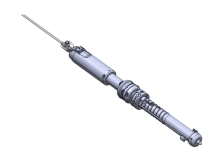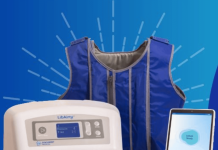Perimeter Medical Imaging AI has completed enrolment for the pivotal trial of its AI-assisted imaging technology, the Perimeter B-Series OCT system, for performing breast-conserving surgeries.
The device is intended to be used in breast cancer patients who are undergoing breast-conserving surgeries to mark the margins and not leave any cancerous tissue. The study’s data will be used to support the device’s clearance from the US Food and Drug Administration (FDA), planned for submission next year.
Related: PARKEO2 clinical trial reaches key enrolment milestone ahead of schedule
This prospective, multi-centre, two-arm trial (NCT05113927) enrolled about 530 women with Stage 0-III invasive ductal carcinoma and/or ductal carcinoma in situ who are undergoing breast-conserving surgeries. The participants were enrolled across ten US sites and were randomised in a 2:1 ratio to the device and control arms.
The study’s primary endpoint is the occurrence of at least one unaddressed positive margin for a subject based on the results of the pathology report generated three to seven days post-surgery. The data from the primary endpoint is expected by the end of the year. Secondary outcomes include the average number of unaddressed positive margins per subject, the number of false positives cavity shaves per subject using the B-Series OCT system, and the efficacy of margin level effectiveness based on US national guidelines and histopathology.
The study also evaluates the safety of the B-Series OCT system by tracking the number of adverse events and patient satisfaction outcomes using the BREAST-Q scale.
The OCT system uses optical coherence tomography (OCT), a non-invasive diagnostic technique that renders an in vivo cross-sectional view of the breast tissue, along with its ImgAssist 2.0 AI algorithm. The device marks the margins during breast-conserving surgeries to decrease reoperation rates due to residual tumours. Identification of tumour margins is done to ensure no cancer cancers remain in the area following the surgery to minimise the risk of recurrence.
The use of AI in the diagnostic imaging market is set to rapidly grow and is forecasted to exceed $1.2bn by 2027, up from $336m in 2022 as per GlobalData analysis. GlobalData also expects the global revenue for AI platforms across healthcare to reach an estimated $18.8bn by 2027.
Multiple companies have developed AI-aided solutions geared towards diagnostics, especially in oncology. In February, Israel-based Magentiq Eye published data from a clinical trial showing that its AI-aided detection colonoscopy tool, Magentiq-Colo CADe, increased adenoma detection by 7%, compared to the conventional colonoscopy group. Adenoma detection and removal is an important part of colorectal screening, with higher adenoma detection rates associated with a reduced risk of developing colorectal cancer.




